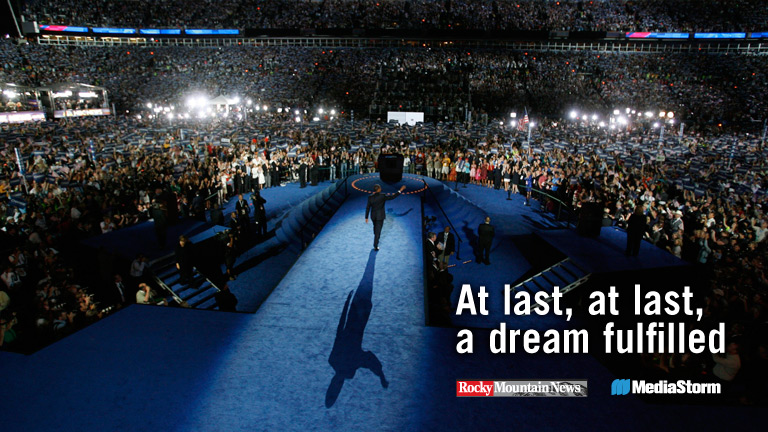John Temple is the editor of Civil Beat in Honolulu. He was also the last editor, president, and publisher of the Rocky Mountain News in Colorado. While at Rocky Mountain News he worked with MediaStorm to produce a piece around the 2008 Democratic National Convention. He maintains an active blog called Temple Talk and was an attendee of MediaStorm’s Methodology Workshop.

Everyone in journalism seems to be talking about how much the industry is changing. What do you believe are the key trends in the industry and how do you believe journalism will adapt?
I think the most important trend is probably an overall sense of disruption where there is no certainty that any approach that has been successful in the past will continue to be viable or support serious journalistic enterprises in the future. That’s perhaps the largest trend, dramatic disruption of the traditional business model. And then related to that is the convergence of media where, in the hands of an individual are tools that are as powerful as what major corporations had to invest significant amounts of dollars in. The barriers to entry are so low today that it’s completely transformed and raised questions about what is journalism and who does it.
When you were with Rocky Mountain News in Colorado you collaborated with MediaStorm on a piece about the Democratic National Convention coming to Denver. Can you talk about how that project worked?
It’s almost hard to believe it’s not even three years ago since we worked together with MediaStorm. In some ways the Democratic National Convention in Denver arguably was the high point of journalism at the Rocky Mountain News because we had branched out into multimedia and online journalism. What was great about that particular experience was that by working as a team it wasn’t just MediaStorm producing a documentary, it was a collaboration. We learned a lot from working with MediaStorm and were able to elevate the skill level and the sophistication of our staff because we combined it with training. So really positive experience for the Rocky Mountain News, and I think it made it possible for us to produce the documentary we did on the closing of the Rocky which was called Final Edition and which ultimately won a regional Emmy for documentaries. And I don’t think that would have been possible without working with MediaStorm first and refining our multimedia storytelling skills.
What were the takeaways from working with MediaStorm?
I think how to think about structure. There was a real awareness of structure and there was a real commitment to audio that I think was really important. And also just frankly the quality of the people on the team. The MediaStorm team was really great. It’s always fun to work with really highly skilled people that you haven’t worked with before. Because it’s inevitable that in the collaboration you’re going to learn a lot from each other and I think that happened.
I think MediaStorm came up with a good way to tell the story, which was through the journalists covering the story. In many ways it’s always good for journalists to be interviewed because it reminds them of what it’s like to be on the other side of the microphone. They were doing two camera interviews and the lighting was really interesting. So you learn what it took to do that level of interviews.
At Civil Beat you have a very community oriented approach to how you engage your audience. You use a combination of social media tools directly in your site and you have staffers that keep up regular blogs and twitter feeds. How is audience engagement going evolve in the future?
We see our journalism starting from a question. The idea is that by asking questions we’re going to make the world a better place, we’re going to make our community a better place, that questioning leads to change. We’re hoping to identify a community that wants to ask questions. When we do that, they’re engaged in a dialogue with us where they’re really asking us to do their work for them. There is a loop there, there is a form of dialogue there that ultimately leads to a self-awareness in the community and a possibility of change.
The other thing that I noticed when I was going through your site is that you do a nice job of doing a truth check on everything. It seems like most sites only do that when something is questionable. There are a lot of examples on your site where you state that things have been said truthfully and you don’t see that too often on other sites.
We try not to make that a “gotcha” feature. We try to make it a feature that is more based on the question, “Could that really be true?” So we definitely do not want them all to be ‘false’. We want it to be that anytime someone says a defining or important statement we help people determine if they can believe it. The other thing we do is post them in progress. We can get hung up on waiting until we find the answer, and instead of doing that we post the statement and whatever we can find out about it to begin with. Then you see how people interact with it and what questions they ask. We think people learn more by those kinds of features than they do by traditional news stories where there is a conventional narrative structure. In this way you might get a quasi-civics lesson without really knowing you’re getting one, because you’re explaining how a court system works for example. We have some in the works right now, “Is it really true that Hawaii is the most diverse place on earth?” Well that’s a myth that’s propagated here so is that really true? We’ll start that conversation. It’s really been a good feature for us and it’s been a very defining feature in the community.
Today a significant number of people count twitter as their number one source of news. With such fast and tightly packaged stories filling the airwaves how do we tell a story that deserves more than 140 characters? Or deliver a video package that takes more than 3 minutes to do it justice?
I think Twitter is not the way to do that. Twitter is a great tool for being like a nerve ending. Twitter’s strength is in immediacy, and speed. So use that tool for that. I don’t think it’s the most powerful tool to drive eyeballs and interest, it’s a different type of tool. I think that Facebook is actually a much better way to distribute longer form pieces because it depends more on the endorsement of trusted friends and there’s an ability to see, in one place, the collective comments on a piece.
When we bemoan what’s happening with long form journalism, the reality is in some ways it’s so much better today because a single individual can produce something and share it. I think about the idea of getting a film shown in the past versus getting something shown today, it is completely different. There is a place for that nerve ending of Twitter and there’s a place for the long form.
Now how it gets supported financially that’s a whole other story. But there’s a question about how Twitter’s going to get supported financially too. The danger with short form is that it’s commoditized. You have to ask yourself what special advantage do you have in producing short form? It’s very hard to establish an advantage in that space I think.
How do you know when you’ve been successful?
One level of success no matter what other people think is did you treat your subjects respectfully and with integrity and honesty? If you didn’t, you’re not successful in my eyes.
One of the ways you know you’ve been successful is these people tell you that they learned something, that they see the world different, they appreciate what you’ve shared with them. But people could be very upset by something, and angry about it, and you still could have been very successful. So you don’t only want to judge success based on praise or positive response. Success may be that you’ve just told one hell of a story and people are really really unhappy about that story being made public.
You want to be really careful about focusing on success or failure and much more focused on the work itself and your own experience doing it. Try to learn from what you did and have some sense of independence and ask yourself what did you learn from the experience? And to me, that’s one level of success. Did you learn? Did you grow by telling the story?
So there are really many different kinds of success. People should be careful of judging success from external factors.

